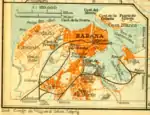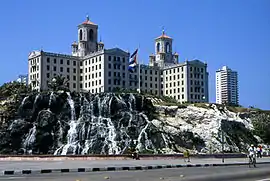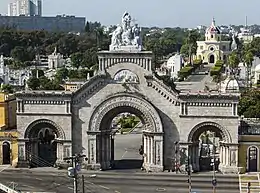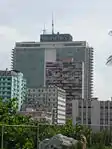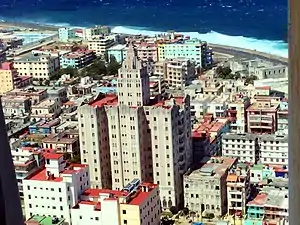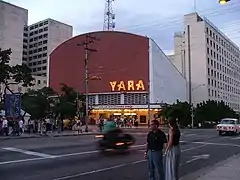Vedado
Vedado (Spanish: El Vedado, Spanish pronunciation: [el βeˈðaðo]) is a central business district and urban neighborhood in the city of Havana, Cuba. Bordered on the east by Calzada de Infanta and Central Havana, and on the west by the Alemendares River and Miramar / Playa district, Vedado is a more modern part of the city than the areas to the east, developed in the first half of the 20th century, during the Republic period. In 2016 it was described by one commentator as the city's "most affluent" section.[1] The main street running east to west is Calle 23, also known as "La Rampa". The northern edge of the district is the waterfront seawall known as the Malecón, a famous and popular place for social gatherings in the city. The area popularly referred to as 'Vedado' consists of the wards (consejos populares) of Vedado, Rampa, Vedado-Malecón and Carmelo, all in the municipality of Plaza de la Revolución.
Vedado District
Distrito del Vedado | |
|---|---|
.jpg.webp) | |
| Country | |
| Municipality | |
| Founded | 1858 |
| Government | |
| • Type | Mayor-council government |
| Elevation | 45 m (148 ft) |
| Population (2023) | 108,369 |
| Time zone | EST |
| Area code | (+53) 7 |
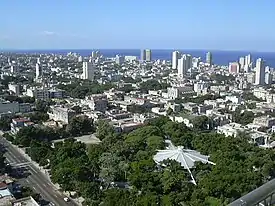
Notable sites
Among the notable sites in Vedado are the hotels: Hotel Nacional de Cuba (National Hotel), the Havana Libre (former Hilton), Melia Cohiba Hotel and Hotel Riviera.
In addition:
- Colon Cemetery
- FOCSA Building, tallest building in Cuba at 121 m
- Edificio del Seguro Médico, Havana
- López Serrano Building, first skyscraper in Cuba
- Radiocentro CMQ Building
- Coppelia (ice cream parlor)[2]
- Embassy of the United States, Havana
- José Martí Anti-Imperialist Plaza
- Jewish religious centers include the Gran Sinagoga Bet Shalom and the Centro Hebreo Sefaradi
- John Lennon Park, named for the statue of Lennon located there
- Monument to the Victims of the USS Maine
- University of Havana
- National broadcast center for Cuban television.
- Cementerio Chino (The Chinese Cemetery)[3]
Nearby neighborhoods include:
- To the east: Central Havana
- To the west: Miramar
Economy
Aero Caribbean has its headquarters in Vedado.[4]
The Venezuelan airline Conviasa has an office in the IACC Building in Vedado.[5]
Government and infrastructure
Instituto de Aeronáutica Civil de Cuba, Cuba's civil aviation authority, has its headquarters in Vedado.[6]
Culture
Gay scene
23rd Street in Vedado is also the centerpoint of the city's gay scene in a country which now grants many rights to LGBT citizens. At night, 23rd St. is reminiscent of a gay district between the Cinema Yara and Coppelia ice cream parlor, and the foot of 23rd at the Malecón, with numerous gay entertainment options nearby such as the Bim Bom outdoor bar and the Las Vegas nightclub. Many of the casas particulares target LGBT clients as customers.[7]
See also
References
- Naomi Larsson (September 5, 2016), "Havana's Dirty Truths", The Guardian, Cities
- Cuba, the Test of Time
- "Cementerio Chino". Havana City Guide. 2013-12-20. Retrieved 2019-01-22.
- "Directory: World Airlines." Flight International. March 16–22, 2004. 47. "Calle 23, No 64 esq. a PVedado, Havana, Cuba"
- "Commercial and Sales Offices ." Conviasa. Retrieved on May 23, 2017. "Address: Street 23, Esq No. 64, Building IACC, Vedado. Infanta municipio Plaza La Revolution. "
- Home Archived 2010-11-08 at the Wayback Machine. Instituto de Aeronáutica Civil de Cuba. Retrieved on October 5, 2010. "Dirección: Calle 23 # 64, Vedado, Plaza de la Revolución, Ciudad de La Habana, Cuba."
- "Visit Cuba - The Official Travel Guide to Cuba - Visit Cuba".
Bibliography
- Carles Crosas Armengol (2008). "Reticulas verdes, nuevas ciudades decimonönicas. El paradigma del Vedado, 'En sanche Jardin' de La Habana" [Green grids, new nineteenth-century cities; the paradigm of Vedado, garden of Havana] (PDF). Revista Iberoamericana de Urbanismo (in Spanish). Polytechnic University of Catalonia. ISSN 2013-6242.
- Günter Mertins [in German]; Orestes Sardiñas Gómez (2014). "El Vedado / Havana (Cuba): Consequences of the Transformation Process Within a Former Upper-Class Residential Quarter". Erdkunde. 68 (3): 209–217. doi:10.3112/erdkunde.2014.03.05. ISSN 0014-0015. JSTOR 24365233.
